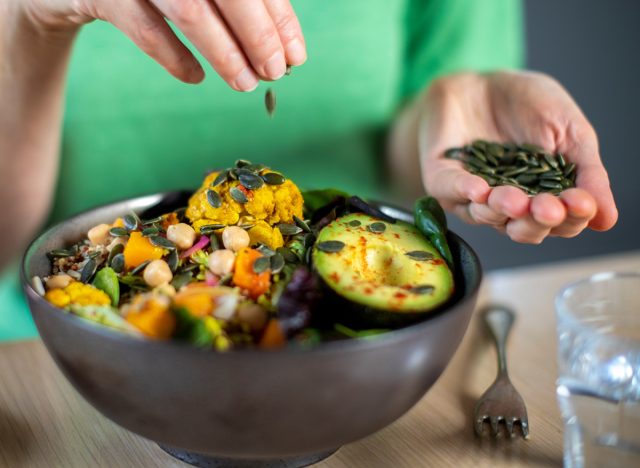This Surprising Habit Keeps the Longest Living People Thin

The current life expectancy in the United States is 77 years old, according to the Centers for Disease Control and Prevention. Compared to other countries, specifically those that live in the Blue Zones, Americans don't live nearly as long. For example, life expectancy in Japan is 85 years, according to The World Bank. And one major factor that can lengthen your life is maintaining a healthy weight, which one 2017 study found could lengthen your life by 7 years. And that is directly impacted by the diet you choose to eat.
"People may not realize how powerful food really is! Food contains nutrients that directly impact our overall health–and impact all our body processes and systems, such as the immune system, brain, muscles, cardiovascular system, and internal organs," says Roxana Ehsani, MS, RD, CSSD, LDN, registered dietitian nutritionist and National Media Spokesperson for the Academy of Nutrition and Dietetics.
She adds that eating well can help ward off and reduce the risk of developing chronic conditions or diseases like diabetes, high blood pressure or high cholesterol levels, or even certain cancers. And of course, the food you eat can also impact your body weight.
And one habit that keeps the longest living people thin is eating a variety of plant-based foods.

"Specifically, try to consume more plant-based protein options like beans, lentils, nuts, and seeds," says Ehsani. "These plant-based protein options not only are great sources of vegetarian/vegan-friendly protein, but they also contain dietary fiber, which promotes overall gut health and can promote healthy gut bacteria."
She adds that researchers found as we age, our gut diversity decreases, which puts us at more risk for chronic health conditions like cardiovascular disease, diabetes, and irritable bowel disease.
But one way to keep your gut diverse and balanced is to strive to eat a diversity of plant-based foods each and every day.
"You don't need to avoid meat, but replacing one or two meals a week with a plant-based protein option, may help you gain longevity points," she says. "Furthermore, red meat and processed meats like sausage, bacon, deli meats, are high in saturated fat, which is pro-inflammatory, and can cause plaque buildup, which increases the risk for both heart and neurodegenerative diseases."
Try to swap out the red meat for lean cuts of protein and plant protein choices, such as beans, lentils, peas, nuts, and seeds.
She suggests you start off by focusing on one meal a week.
"For example, maybe choose Mondays to have a meatless meal for meatless Mondays. You could serve up some baked falafel instead of chicken, or have a black bean chili without the ground meat/turkey, or have lentil soup instead of chicken," she says. "Or make your own bean or lentil burgers, instead of having beef burgers."
She also recommends incorporating plant-based protein sources into snack time too.
"For example make a bean-based dip like hummus using not only chickpeas, but using white beans, black beans, fava beans, or lentils (really any legume would work), and serve it with a variety of different veggies," she says. "Or make a delicious plant-based grain bowl using bulgur, chickpeas, pistachios, Persian cucumbers, tomatoes, red onion, parsley, mint leaves, and olive oil."









